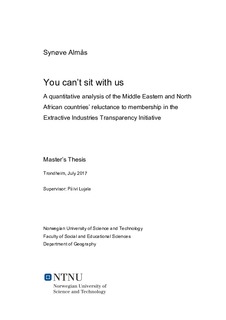| dc.description.abstract | The Extractive Industries Transparency Initiative (EITI) was created in the early 2000s as a response to the growing concern of corruption in the natural resource industries. 52 states have since joined, but countries located in the Middle East and North Africa region are reluctant. Only three countries in this region have joined, despite the fact that Middle Eastern and North African countries often have an abundance of petroleum resources. By using relevant theory regarding the region and international cooperation, this thesis proposes a framework for analysis based on an earlier published paper to determine what causes Middle Eastern and North African (MENA) countries to not be interested in EITI membership. Three possible explanations are tested: 1) a MENA regional effect, 2) oil rents, and 3) membership in the Organization for Petroleum Exporting Countries (OPEC). The results show no significant unambiguous regional effect by MENA location on EITI membership. The analysis does, however, give evidence to suggest higher oil rents makes a country more likely to be an EITI member. OPEC does not prove to be a determinant of EITI membership overall, but there is some evidence that OPEC membership decreases the likelihood of EITI membership when the data analysis is done on highly resource-endowed countries. The results surprisingly indicate a positive impact of oil rents on EITI membership, which contradicts the existing assumption that oil abundant countries located in the Middle East or North Africa would be less likely to be EITI members compared to Western countries. These results are robust to a number of economic, political and development control variables. The findings illustrate that natural resources, OPEC membership and MENA regional effect are perhaps not as disadvantageous for a country’s participation in international initiatives as previously thought. | nb_NO |
